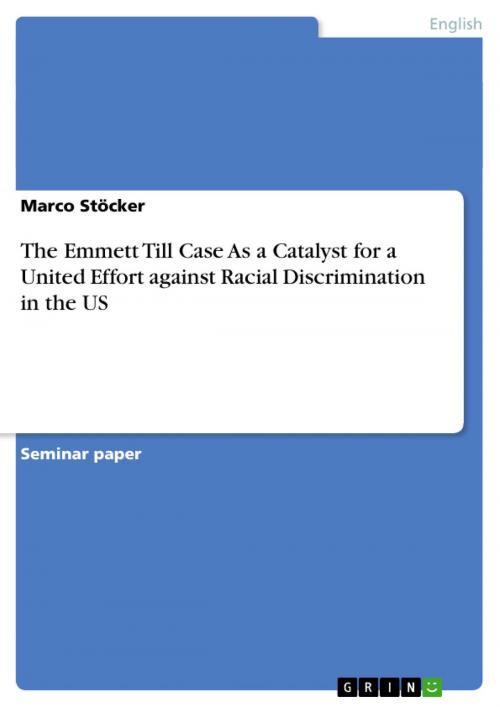The Emmett Till Case As a Catalyst for a United Effort against Racial Discrimination in the US
Nonfiction, Reference & Language, Study Aids, ESL, Foreign Languages| Author: | Marco Stöcker | ISBN: | 9783656450535 |
| Publisher: | GRIN Publishing | Publication: | June 24, 2013 |
| Imprint: | GRIN Publishing | Language: | English |
| Author: | Marco Stöcker |
| ISBN: | 9783656450535 |
| Publisher: | GRIN Publishing |
| Publication: | June 24, 2013 |
| Imprint: | GRIN Publishing |
| Language: | English |
Seminar paper from the year 2012 in the subject English Language and Literature Studies - Culture and Applied Geography, grade: 1,3, LMU Munich, language: English, abstract: You may not realize it but you are making history. Bobo is not the only Negro that was lynched in Mississippi, but this is the first trial of its kind that has ever been held in Mississippi. The kind of death your son died is responsible for this trial. (Hudson-Weems, 2006, p.3) This citation is taken from the unpublished biography of the energetic Civil Rights activist Rayfield Mooty. It addresses to Mrs. Mamie Till Bradley, mother of Emmett Louis Till. The 14-year-old Emmett Till was from Chicago (IL) visiting his relatives in the Mississippi Delta in August 1955 where he fell victim to race related violence. The black boy reportedly flirted with a white woman; an absolute taboo in the Jim Crow South. Her husband and his half-brother, furious about the incident, kidnapped Emmett, mutilated him, shot him in the head and disposed his body in the Tallahatchie River. After the body was found three days later, Mamie Till Bradley insisted on a public funeral with an open casket to 'let the world see, what they did to [her] boy' (cf. Whitfield, 1988, p.23). Although racially motivated lynchings were nothing out of the ordinary in Mississippi, tens of thousands attended the funeral and the media attention was enormous. Goldsby (1996, p.254) refers to it as the 'first great [...] media event of the civil rights movement.' Also other scholars and journalists refuse to date the Civil Rights Movement from the famous Montgomery Bus Boycott and assume that the Emmett Till murder marks the emergence of the Movement. When reviewing the scientific discussion, it is striking that predominantly more recent literature mentions the Emmett Till case as a trigger or as a catalyst for the Civil Rights Movement. This paper is to shed some light on the question why Emmett Till could evolve into such a historically important person given the circumstances that race related violence in Mississippi was nothing out of the ordinary in the 1950s. Therefore, after a brief evaluation of the race relations in Mississippi and in Chicago, the Emmett Till murder case will be examined. In a later part, the paper will address the prerequisites necessary to make the case that famous. Special attention will be given to the commitment of Mamie Till Bradley and the media landscape in the US in the 1950s.
Seminar paper from the year 2012 in the subject English Language and Literature Studies - Culture and Applied Geography, grade: 1,3, LMU Munich, language: English, abstract: You may not realize it but you are making history. Bobo is not the only Negro that was lynched in Mississippi, but this is the first trial of its kind that has ever been held in Mississippi. The kind of death your son died is responsible for this trial. (Hudson-Weems, 2006, p.3) This citation is taken from the unpublished biography of the energetic Civil Rights activist Rayfield Mooty. It addresses to Mrs. Mamie Till Bradley, mother of Emmett Louis Till. The 14-year-old Emmett Till was from Chicago (IL) visiting his relatives in the Mississippi Delta in August 1955 where he fell victim to race related violence. The black boy reportedly flirted with a white woman; an absolute taboo in the Jim Crow South. Her husband and his half-brother, furious about the incident, kidnapped Emmett, mutilated him, shot him in the head and disposed his body in the Tallahatchie River. After the body was found three days later, Mamie Till Bradley insisted on a public funeral with an open casket to 'let the world see, what they did to [her] boy' (cf. Whitfield, 1988, p.23). Although racially motivated lynchings were nothing out of the ordinary in Mississippi, tens of thousands attended the funeral and the media attention was enormous. Goldsby (1996, p.254) refers to it as the 'first great [...] media event of the civil rights movement.' Also other scholars and journalists refuse to date the Civil Rights Movement from the famous Montgomery Bus Boycott and assume that the Emmett Till murder marks the emergence of the Movement. When reviewing the scientific discussion, it is striking that predominantly more recent literature mentions the Emmett Till case as a trigger or as a catalyst for the Civil Rights Movement. This paper is to shed some light on the question why Emmett Till could evolve into such a historically important person given the circumstances that race related violence in Mississippi was nothing out of the ordinary in the 1950s. Therefore, after a brief evaluation of the race relations in Mississippi and in Chicago, the Emmett Till murder case will be examined. In a later part, the paper will address the prerequisites necessary to make the case that famous. Special attention will be given to the commitment of Mamie Till Bradley and the media landscape in the US in the 1950s.















